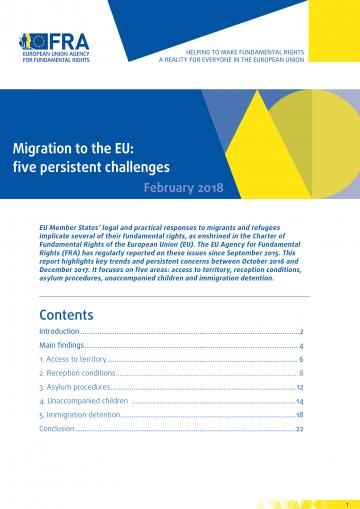After two years of reporting, FRA will continue to report on migration-related fundamental rights concerns in selected EU Member States. The drop in new arrivals has not led to a decrease in fundamental rights concerns, but identified problems appear to persist, often remaining the same throughout several months.
This report covers:
- Access to territory
- Reception conditions
- Asylum procedures
- Unaccompanied children
- Immigration detention
Main findings
Access to territory
- Access to EU Member States’ territory has become more difficult in almost half of the EU Member States covered. Despite a significant drop in newly arriving asylum seekers, in most EU Member States, the management of external and internal borders remained in emergency mode or became stricter. Several EU Member States re-introduced border controls and kept them throughout 2017.
- Police and border guards reportedly ill-treated migrants, particularly on the Western Balkan route, and in Spain in certain locations.
- Some persons wishing to apply for asylum were denied entry to the EU and/or returned without an opportunity to apply for protection; others were collectively pushed back at land or sea borders.
Reception conditions
- The number of asylum applicants that a country received is not necessarily linked to the quality of its reception conditions. Despite the relatively low numbers, reception conditions in several EU Member States did not improve. In countries where numbers of new arrivals remained high, capacity and poor living conditions caused concern.
- Inadequate reception conditions sparked many protests and other incidents.
- Although some positive developments regarding the protection of vulnerable asylum seekers were reported, these were outweighed by challenges regarding their identification, accommodation, and provision of special care and support.
- Sexual and gender-based violence in reception centres remains an issue in some EU Member States.
- Room for improvement in the treatment of lesbian, gay, bisexual, transgender and intersex (LGBTI) asylum seekers was observed in the majority of EU Member States.
Asylum procedures
- Challenges regarding the identification and registration procedures persisted in some EU Member States; for example, required timeframes were not respected or qualified staff was lacking.
- Some EU Member States decided on applications for international protection in border or transit zones, leading to long waiting periods in inadequate conditions, including for vulnerable persons.
- Issues regarding lengthy asylum procedures, too little time for decision-making, shorter deadlines for appeals and insufficient justifications of appeal decisions were reported in several EU Member States.
- Due to the large backlog of asylum applications, some EU Member States accelerated the asylum procedure, raising concerns over the quality of interviews and decision-making.
- Specific national guidelines for interviewing persons facing persecution based on sexual orientation or gender were available only in a few EU Member States, and LGBTI asylum applicants faced credibility doubts.
- Legal and practical obstacles to accessing legal aid, information and interpretation existed in all EU Member States covered.
Unaccompanied children
- In most EU Member States, reception places for unaccompanied children were sufficiently available due to a drop in new arrivals. In a few EU Member States, the number of children decreased and the quality of child reception facilities improved. In many EU Member States, however, reception standards for children remained critical.
- Asylum-seeking children in several EU Member States had no or limited access to education.
- Children continued to face legal and practical obstacles to accessing asylum procedures in several EU Member States. In particular, problems regarding the appointment of guardians for unaccompanied children barely improved.
- Age assessment methods have been heavily criticised from a fundamental rights perspective – for example, when children were not given the benefit of the doubt concerning their age and treated as adults, or because age assessment procedures consisted purely of medical examinations.
- Legal and practical barriers to family reunification for beneficiaries of subsidiary protection was a great concern for unaccompanied children in several EU Member States.
Immigration detention
- Some positive developments in alternatives to detention and the provision of leisure activities to children were reported in some EU Member States covered. Nonetheless, in several EU Member States, challenges remained regarding legal assistance and information, conditions in detention facilities and the detention of vulnerable persons.
- In recent months, the use of immigration detention increased in certain EU Member States covered.
- Obstacles to obtaining legal aid and/or information were reported in some EU Member States.
